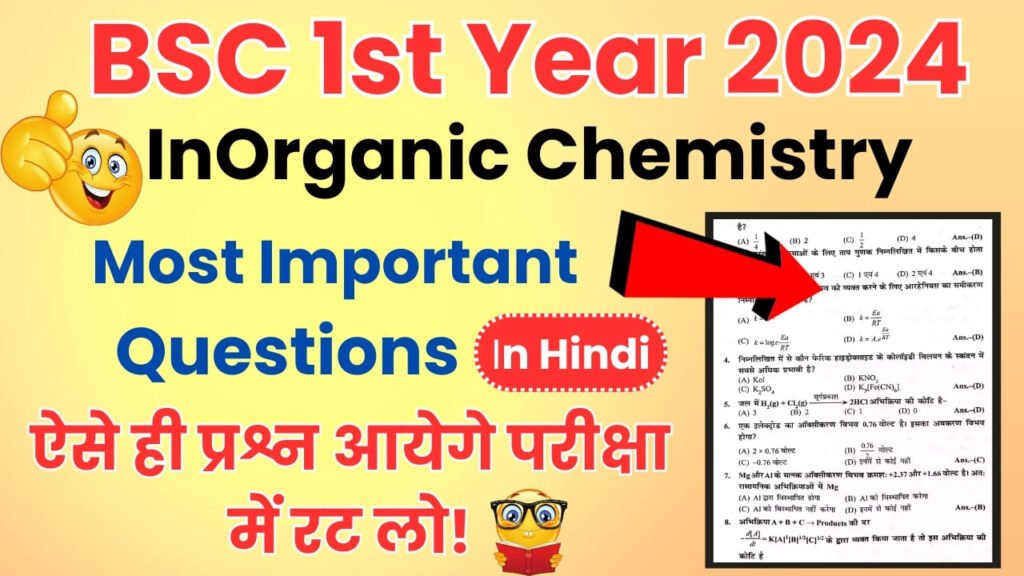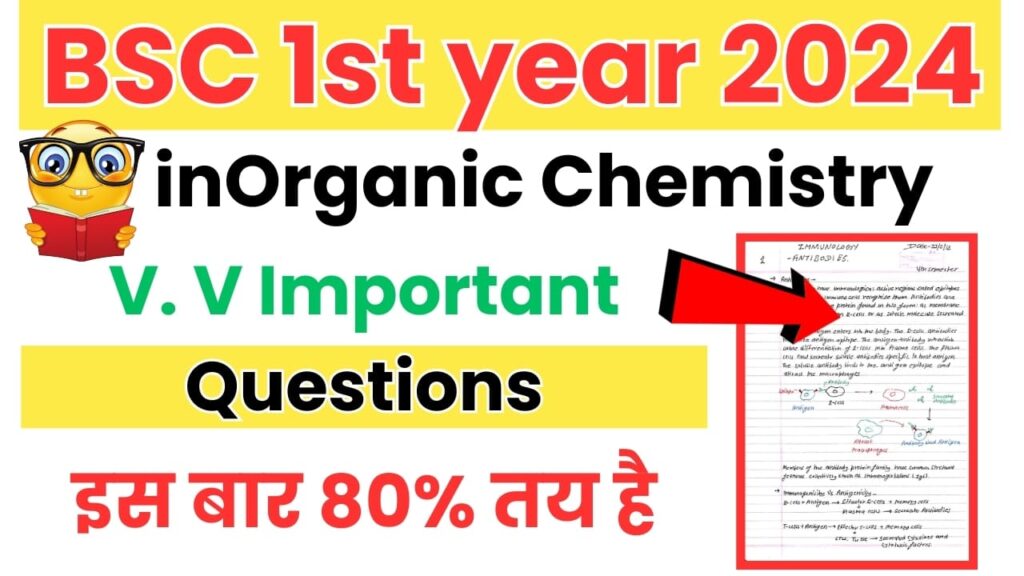नमस्कार साथियों क्या आप जानना चाहते है BSC 1st Year InOrganic Chemistry Important Questions in Hindi 2024 के बारे में? दोस्तों आपका स्वागत है इस लेख में, हम आपको BSC 1st Year Organic Chemistry Important Questions in Hindi के साथ BSC 1st Year Organic Chemistry Important Questions in Hindi, BSC 1st Year Physical Chemistry important questions 2024 के बारे में सब कुछ बताएंगे।

जैसा कि आप जानते हैं Chemistry एक बहुत ही दिमाग लगाने वाला subject है, तो इस लेख में हमने BSC 1st Year InOrganic Chemistry Important Questions इकट्ठा किया है जो कि आपको पढ़ने में मदत करेंगे अगर आप इस लेख में बताए हुए Important Questions को एक बार रट लेंगे तो आप समझ लो 60% syllabus cover हो जाएगा, तो BSC 1st Year InOrganic Chemistry Important Questions In Hindi की पूरी सूची पढ़ने के लिए इस लेख को अंत तक जरूर पढ़ें ।
यह BSC 1st Year InOrganic Chemistry Important Questions के महत्वपूर्ण प्रश्न 2024 प्रतिष्ठित संस्थानों के अनुभवी शिक्षकों द्वारा तैयार किए गए हैं, इन प्रश्नों के पेपर में आने की अधिक संभावना है, इसलिए इन्हें अच्छी तरह से तैयार करें।
BSC 1st Year InOrganic Chemistry Important Questions in Hindi

Q1: परमाणु क्रम में सबसे बड़ा और सबसे छोटा तत्व कौनसे हैं? (What are the largest and smallest elements in the periodic table?)
Q2: धातुओं और अम्लों के बीच में क्या अंतर है? (What is the difference between metals and non-metals?)
Q3: कैसे पायदानिक आवर्त की आवर्तीयता की सारणी तैयार की जाती है? (How is the periodic table of elements arranged?)
Q4: आधुनिक आवर्त सारणी के किस विशेषता के लिए डिमिट्री मेंडेलीएव ने नोबेल पुरस्कार प्राप्त किया था? (For which characteristic of the modern periodic table did Dmitri Mendeleev receive the Nobel Prize?)
Q5: क्या है ‘एनियों’ का अर्थ? (What does ‘anions’ mean?)
Q6: अम्ल क्या होता है? (What is an acid?) Q7: ‘विलयन’ क्या होता है? (What is ‘dissociation’?)
Q8: क्या होते हैं ‘धातु’ और ‘अधातु’? (What are ‘metals’ and ‘non-metals’?)
Q9: ऑक्सीडेशन और रीडक्शन के क्या सिद्धांत हैं? (What are the principles of oxidation and reduction?)
Q10: वास्तविक अवधारणा क्या है? (What is the concept of reality?)
Q11: कैसे अम्लों को श्रेणीबद्ध किया जाता है? (How are acids classified?)
Q12: ‘फास’ क्या होता है? (What is a ‘phase’?)
Q13: किस तरह किया जाता है ऑक्सीडेशन स्थिति की पहचान? (How is the identification of oxidation state done?)
Q14: लकड़ी के तेल क्या होता है? (What is wood tar?)
Q15: कार्बनिक योजना क्या होती है? (What is organic plan?)
Q16: केमिकल इकाइयों के बीच अधिकतम समान्यता क्या है? (What is the maximum commonality between chemical units?)
Q17: जलवायु परिवर्तन क्या है? (What is climate change?)
Q18: प्राथमिक संरचना क्या होती है? (What is primary structure?)
Q19: किस तरह की पद्धति से विद्युत द्वारा धातुओं को निष्क्रिय किया जाता है? (How are metals deactivated by electricity?)
Q20: धातु संरचना क्या होती है? (What is metal structure?)
Q21: क्या होता है धातुओं का ग्रुप? (What is the group of metals?)
Q22: धातु और अधातु की विशेषताएँ क्या होती हैं? (What are the characteristics of metals and non-metals?)
Q23: रासायनिक बंध क्या है? (What is a chemical bond?)
Q24: धातुओं की जलन तत्व क्या होती है? (What are the burning elements of metals?)
Q25: सांद्रता क्या है? (What is density?)
Q26: कैसे अधातुओं को पहचाना जाता है? (How are non-metals identified?)
Q27: क्या होता है ‘धातुओं का समूह’? (What is the ‘group of metals’?)
Q28: आयन क्या होता है? (What is an ion?)
Q29: ऑक्सीडेशन और रीडक्शन के क्या सिद्धांत हैं? (What are the principles of oxidation and reduction?)
Q30: अम्ल क्या होता है? (What is an acid?)\
Also Read:
- BSC 1st Year Organic Chemistry Important Questions in Hindi 2024! ऐसे ही प्रश्न आयेगे परीक्षा में रट लो!
- BSC 6th Sem Chemistry Important Questions In Hindi 2024! इस बार यही आएगा, जल्द देखिए
- BSC 5th Semester Chemistry Important Questions in Hindi 2024! इस बार यही आएगा, जल्द देखिए
हमें उम्मीद है कि इस लेख की मदद से आपको BSC 1st Year InOrganic Chemistry Important Questions in Hindi 2024 के बारे में जानकारी मिल गई होगी।
दोस्तों आपको यह पोस्ट कैसी लगी कृपया हमें कमेंट सेक्शन में बताएं और यदि आपके कोई प्रश्न हों तो बेझिझक हमसे Comment Box में पूछ सकते हैं। यदि आपको यह पोस्ट उपयोगी लगी तो कृपया इसे दूसरों के साथ साझा करें।